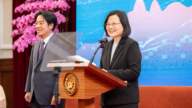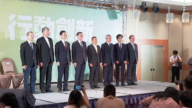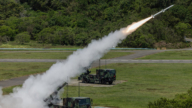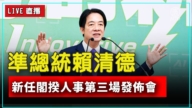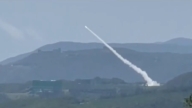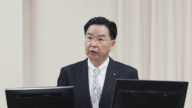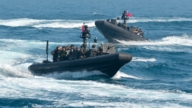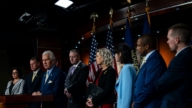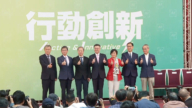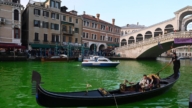【新唐人2014年09月03日讯】台北地检署侦办陆委会前副主委张显耀泄密案。马英九总统日前召开记者会,亲自出面回应此案,他说,这个案件只是两岸关系的“小波澜”。但台湾学者指出,张显耀是跟大陆谈判的主要负责人,如果他泄密,将对台湾安全造成很大影响。但是马政府为了维系和扩大跟大陆的经济关系,有意大事化小。
马英九用“大树”比喻两岸关系,他说,如果发现两岸关系有“害虫”,就要以啄木鸟的态度,把害虫找出来除掉,“张显耀案”只是两岸关系的“小波澜”。
“海基会”董事长林中森,8月30号在江苏白鹭湖山庄,和“海协会”会长陈德铭举行闭门会议时,也说此案是两岸关系的“枝微末节”。“海协会”会长陈德铭也说,就两岸关系发展的大局而言,张显耀案件是很小的事情。
官员的说辞,显示出两岸高层,都希望把“张显耀案”大事化小。不过,台湾学者则更多的担忧台湾的安全。
台湾大学经济学系教授张清溪表示,张显耀身为跟大陆谈判的主要负责人,如果真的泄密,那么台湾非常危险。
台湾大学经济学系教授张清溪:“那在这种情况之下,故意要把这个事情模糊变成说是“小波澜”“小的问题”,这个东西是讲不通的。因为他是一个非常主要的谈判者。所以如果是真的话,两岸的关系就非常的危急。现在还要继续再谈什么‘服贸’,‘货贸’,这东西其实都应该好好思考一下,是否应该再谈下去。”
台湾大学新闻研究所的张锦华教授表示,马英九政府的一些发言,可能是在安抚人民,但是有点“此地无银三百两”。
台湾大学新闻研究所张锦华教授:“如果真的没有什么关系的话,他也不用出来说明,大家也不会认为有什么关系。就是因为可能这个影响其实还蛮大的。其实光是从泄密本身来说的话,就涉及到两方面都有人,一方面泄密,另一方面接受秘密。所以其实谈判人员彼此之间的互信,或是台湾跟中国之间在谈判中互信的基础,可能都已经受到很大的影响。”
张锦华进一步分析说,如果张显耀泄密的话,那么他之前代表台湾,和大陆签订的所有协定都会面对非常大的质疑,甚至被要求废除。
那么,马英九政府为什么无视威胁,仍然抱着“大事化小”的态度呢?
张锦华分析说,马英九认为,跟中共尽快达成所谓“自由贸易协定”,会有助于台湾的经济发展。但是,这样一个说法现在已经受到很多质疑。
张锦华:“走入中国,我们并没有走向世界。走入中国之后,台湾反而被锁在中国,事实上走向中国,反而造成台湾很多的经济反而不能发展,反而优势被中共所窃取所利用,所返回来攻击台湾。所以这个策略本身重新的思考和改变,其实变得很重要。”
张清溪也认为,马英九将拉近两岸关系看成一种“成就”,但是其实在比较长远的历史来看,反而可能成为非常大的“污点”。
而近期香港的局势,也让台湾学者看到了“前车之鉴”。
张锦华表示,从最近香港的状况就可以看到,中共对于独裁和自身的利益丝毫不放手,而对于人民所争取的监督权利,却丝毫不让步。使人高度怀疑,两岸之间的任何协商会有什么意义。
张锦华:“事实上之前,我们签订了一些,包括台商的保护,包括司法互助等等,其实都因为中共本身的制度,它就不是一个尊重司法,它就是不是一个司法独立,它就不是一个有监督权力的机制。因此两岸之间的谈判,对台湾而言,其实都要认清这是一个与虎谋皮的结果。”
《美国之音》报导说,美方已经郑重澄清,没有介入“张显耀案”,但已经告诉台湾,高官为北京担任间谍,并不是没有前例可循的。以此前的“罗贤哲少将案”来说,就是美方发现后通知台方,马英九政府才进行调查,并将其判处无期徒刑。
采访编辑/秦雪 后制/陈建铭
Ma Ying Jeou De-escalated The CCP Spy Case Of Chang Hsien-Yao
Taibei City Local Prosecution Agency is investigating
the leaked case of Chang Hsien-Yao, former vice chairman
of Taiwan Mainland Affairs Council.
President Ma Ying Jeou recently held a press conference
in which he personally responded to the case.
He said the case is just the “small waves"
made during cross-strait relations.
However, Taiwan scholars have pointed out that Chang
Hsien-Yao is the main person in charge of negotiations
with Mainland China;
If he leaked confidential information, this would cause
a significant impact on Taiwan’s security.
But Ma’s government intends to trivialize
the case in order to maintain and expand
the economic relations with Mainland China.
Ma Ying Jeou cited a “big tree" as a metaphor for
cross-strait relations.
He said, “if we find the pestsof cross-strait relations,
it is necessary to have a woodpecker’s attitude to spot
and get rid of the pests.
He said the Chang Hsien-Yao case is only “small waves"
made during cross-strait relations.
On Aug. 30, Straits Exchange Foundation (SEF) Chairman
Lin Join-Sane held a closed-door meeting at Egret Lake Villa
of Jiangsu Province with Chen Deming, the President of the
Association for Relations Across the Taiwan Strait (ARATS).
Lin Join-Sane also said the leak case
is a “side and trivial issue."
The President of ARATS, Chen Deming, also said that
in terms of the overall situation
of the development of cross-strait relations,
the Chang Hsien-yao case is a very small matter.
Such remarks from the incumbent officials show that
the high-levels on both sides of the strait want to trivialize
the Chang Hsien-yao case.
However, Taiwan scholars are more worried
about Taiwan’s security.
National Taiwan University Economics Professor Chang
Ching-Hsi said that as a main coordinator of negotiations
with Mainland China, if Chang Hsien-Yao really leaked
the confidential information, then Taiwan is very dangerous.
National Taiwan University Economics Professor
Chang Ching-Hsi: “Under such a circumstance,
deliberately denoting this matter vaguely as “small waves"
and “small problems" does not make sense.
He is a very major negotiator on behalf of Taiwan.
So if this case is true, the relationship
between the two sides should be very critical.
Now the so-called service trade agreement and goods trade
agreement are intended to continue on in negotiations.
Actually, such sort of thing should be carefully considered,
as to whether there should be further discussion."
Professor Chang Chin-Hua from the Institute of Journalism
of Taiwan University said that some of Ma Ying-Jeou’s
government speeches probably appease the people,
but also “admit their guilt" a little.
Professor Chang Chin-Hua: “If the case really had no impact,
he would not have come out to say something,
and we all would not think there is any effect.
In fact, it might be that the impact is actually quite large.
As far as the leak case itself is concerned, this incident
involves in both of two sides of cross-strait.
One side leaked the confidential information,
and another side accepted the confidential information.
So the mutual trust basis between the negotiators
of the two sides, or between Taiwan and China may
have been subject to considerable influence."
Chang Chin-Hua further analysed that if the leak case
of Chang Hsien-Yao is true, then all prior agreements
signed by him on behalf of Taiwan will be significantly
questioned, and a repeal will even be required.
So why did the Ma Ying-jeou government ignore the threat
and still hold the attitude of “trivializing the case?"
Chang Chin-Hua said that Ma believes that to rapidly
achieve a so-called “free trade agreement"
with the Chinese Communist Party (CCP) will help
Taiwan’s economic development.
However, such an argument has now been questioned
by many people.
Chang Chin-hua: “Taiwan heads into Mainland China,
but we don’t head into the world.
Taiwan heads into China but is in fact trapped in China,
which leads Taiwan’s economy to be unable to develop,
to be stolen and exploited by the CCP
and even further return the attack on Taiwan.
So to re-think and change this strategy itself,
in fact, becomes very important."
Chang Ching-Hsi also believes that Ma Ying-Jeou should
consider a closer cross-strait relations as a kind
of “achievement."
But in fact, from a relatively long-term historical perspective,
this may become a very large “stain."
The recent situation in Hong Kong also allowed
Taiwan scholars see the “failure lesson."
Chang Chin-hua said that from the recent situation in Hong
Kong, it can be seen that the CCP absolutely did not let go
of their dictatorship and their own interests, and did not
resolutely compromise for the supervision rights of people.
This makes people highly suspicious that any negotiations
between the two sides will have little meaning.
Chang Chin-hua: “In fact, before this incident we signed,
some agreements including the protection of Taiwan’s
business, mutual legal assistance and so on.
But the Communist regime itself does not in fact respect
the judiciary and it is not an independent judiciary
with oversight on mechanisms of power.
Therefore Taiwan needs to discern that the negotiations
between the two sides are in fact in pursuit
of an unrealistic result."
Voice of America reported that the United States has
solemnly clarified that they did not intervene in Chang
Hsien-Yao’s case, but informed Taiwan that high-ranking
Taiwanese officials acting as Beijing spies is not without
precedent to follow.
In the previous case of Major General Lo Hsien-che
it is the United States that spotted the case
and notified the Taiwanese side.
Afterward, the Ma administration then began to investigate
and sentenced Lo Hsien-che to life imprisonment.
Interview & Edit/QingXue Post-Production/Chen Jianming


